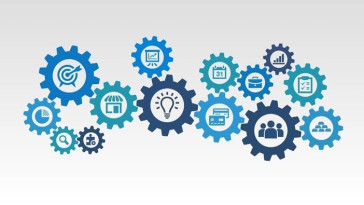Deel 2 van een tweeluik over de meerwaarde van financiële dashboards, geschreven door accountancystudenten en docenten van de Hogeschool Utrecht. Dit tweede deel gaat vooral in op de toepassing van een dashboard in de praktijk.
LINK
This white paper is the result of a research project by Hogeschool Utrecht, Floryn, Researchable, and De Volksbank in the period November 2021-November 2022. The research project was a KIEM project1 granted by the Taskforce for Applied Research SIA. The goal of the research project was to identify the aspects that play a role in the implementation of the explainability of artificial intelligence (AI) systems in the Dutch financial sector. In this white paper, we present a checklist of the aspects that we derived from this research. The checklist contains checkpoints and related questions that need consideration to make explainability-related choices in different stages of the AI lifecycle. The goal of the checklist is to give designers and developers of AI systems a tool to ensure the AI system will give proper and meaningful explanations to each stakeholder.
MULTIFILE

Over de effectiviteit van organisatieadvisering en coaching is tot op heden weinig onderzoek gedaan. Dit onderzoek heeft als doel een bijdrage te leveren aan de kennisontwikkeling hierover. Een vragenlijst werd afgenomen bij 158 cliënten van coaches en organisatieadviseurs. Via de vragenlijst werd gezocht naar verbanden tussen enerzijds de manier van contracteren tussen adviseur en cliënt en de gevolgde aanpak in het adviestraject, en anderzijds de effectiviteit van het traject. Een van de meest opvallende conclusies is dat een cliëntgeleide manier van werken zoals die in de oplossingsgerichte benadering wordt gebruikt, waarbij de cliënt nadrukkelijk de regie heeft en de adviseur hier flexibel op reageert, sterk samenhangt met succes. Het artikel sluit af met enkele concrete aanbevelingen voor adviseurs en suggesties voor vervolgonderzoek.
DOCUMENT

Hoe kan de mkb-accountant digitalisering, ICT en data-analyses inzetten in zijn beroepspraktijk, zodat beter aan de wensen van zijn mkb-klanten wordt voldaan en de eigen bedrijfsvoering en werkprocessen efficiënter worden. In dit project wordt daarvoor een zelfscan en data-analyse protocol ontwikkelt, waarmee de accountant de digitalisering en data-analyse in zijn beroepspraktijk kan verbeteren.

Hoe kan de mkb-accountant digitalisering, ICT en data-analyses inzetten in zijn beroepspraktijk, zodat beter aan de wensen van zijn mkb-klanten wordt voldaan en de eigen bedrijfsvoering en werkprocessen efficiënter worden. In dit project wordt daarvoor een zelfscan en data-analyse protocol ontwikkelt, waarmee de accountant de digitalisering en data-analyse in zijn beroepspraktijk kan verbeteren.Doel De vraag die centraal staat bij dit onderzoek is: Hoe kan de mkb-accountant digitalisering, ICT en data-analyses inzetten in zijn beroepspraktijk, zodat beter aan de wensen van zijn mkb-klanten op het gebied van performance en directere sturing wordt voldaan en de eigen bedrijfsvoering en werkprocessen efficiënter worden? Met het beantwoorden van deze vraag wordt de accountant in staat gesteld zijn weg te vinden in het woud aan mogelijkheden op het gebied van digitalisering, ICT en data-analyse die bestaan of momenteel worden ontwikkeld. Resultaten Eind 2020 is na een eerder ontworpen gedragscode, een tweede keurmerk voor Erkend Financieringsadviseur MKB ontworpen voor niet-bancaire financiers. Met dit onderscheidende label wordt een kwalitatief hoogwaardige advisering (opleiding en blijvende educatie), werkelijke onafhankelijkheid en bindende uitspraken door het Klachteninstituut Financiële Dienstverlening (Kifid) gegarandeerd. Er is grote belangstelling bij marktpartijen voor dit keurmerk. De grootste partijen hebben zich direct gecommitteerd in het gebruik ervan. Lees meer Artikel accountant.nl: De Digitale Accountant: kansen en uitdagingen met informatietechnologie Artikel accountancyvanmorgen.nl: Beroepsorganisatie kan mkb-accountants ondersteunen bij data science vraagstukken Artikel accountant.nl: Invoeren financiële dashboards lastiger dan gedacht Model: Data Analyse Protocol Looptijd 01 april 2020 - 01 oktober 2022 Aanpak Het project bestaat uit zes fasen: Fase 1: Ontwikkeling prototype zelfscan en prototype data-analyse protocol Fase 2: Validatie van prototype zelfscan en prototype data-analyse protocol door toepassing en evaluatie bij deelnemende accountantskantoren Fase 3: Aanpassing en generalisering van prototype zelfscan en prototype data-analyse protocol; Fase 4: Validatie van zelfscan en data-analyse protocol door toepassing en evaluatie bij deelnemende accountantskantoren en accountantskantoren buiten consortium; Fase 5: Definitieve vaststelling van generiek toepasbare zelfscan en generiek toepasbaar data-analyse protocol; Fase 6: Verspreiding van definitieve generiek toepasbare zelfscan en generiek toepasbaar data-analyse protocol onder leden van de Nederlandse Beroepsorganisatie van Accountants
In revalidatie-behandelteams zijn ergotherapeuten de ‘primus inter pares’ voor advisering over hulpmiddelen; hulpmiddelen die mensen met beperkingen ondersteunen bij activiteiten in zelfverzorging, onderwijs, spel, arbeid en wonen. Behoud van deze expertrol vraagt van ergotherapeuten om de nieuwste technologieën te integreren in de praktijk. Een snelgroeiende ontwikkeling betreft technologie waarmee men zelfhulpmiddelen kan ontwikkelen, maken of aanpassen. Zogenaamde do-it-yourself-technologie (DIY) met 3D-printing als bekendste voorbeeld. Revalidatie-ergotherapeuten van Adelante, Libra en Sevagram willen met DIY-technologie aan de slag om hulpmiddelen meer op maat, goedkoper en sneller te vervaardigen in nauwe samenwerking met hun cliënten. Onduidelijk is echter hoe een revalidatiedienst met DIY-technologie eruit kan zien, hoe deze in te bedden is in de dagelijkse praktijk, en hoe doorontwikkeling bewerkstelligd kan worden. Maken van hulpmiddelen met DIY-technologie past bij de identiteit van de ergotherapeut, maar vraagt om nieuwe werkwijzen en samenwerkingsverbanden om nieuwe kennis over techniek, ontwerpen en over materialen. Daarnaast spelen vragen van medische, financiële, ethische en juridische aard een rol. Met de ergotherapeuten kwamen we tot de volgende hoofdvraag: Hoe maken we als ergotherapeuten DIY-technologie, zoals 3D-printen, tot een integraal onderdeel van onze praktijk om met onze cliënten tot maatwerk-hulpmiddelen te komen? Deze vraag wordt binnen de drie centra, in vier fasen (analyse, design/testen, implementatie, doorontwikkeling) opgepakt met actieonderzoek als centrale methode en een diversiteit aan kwalitatieve en kwantitatieve manieren van gegevensverzameling. Partners in deze projectaanvraag (revalidatie-professionals, kennisinstellingen, brancheorganisaties, cliëntenorganisaties en ondernemers) zijn overtuigd dat DIY-technologie meerwaarde biedt voor het aanbod aan hulpmiddelen en invloed heeft op de eigen regie en participatie van cliënten. Met ondersteuning van hun uitgebreide expertise wordt de nieuwe dienst beschreven en wordt een toolbox DIY-technologie ontwikkeld en geïmplementeerd. Ook wordt een database voor zelfgemaakte hulpmiddelen en een DIY-community gerealiseerd. Deze kennis wordt gebruikt in het onderwijs van ergotherapie, Healthcare Engineering en Communication and Multimedia-Design.